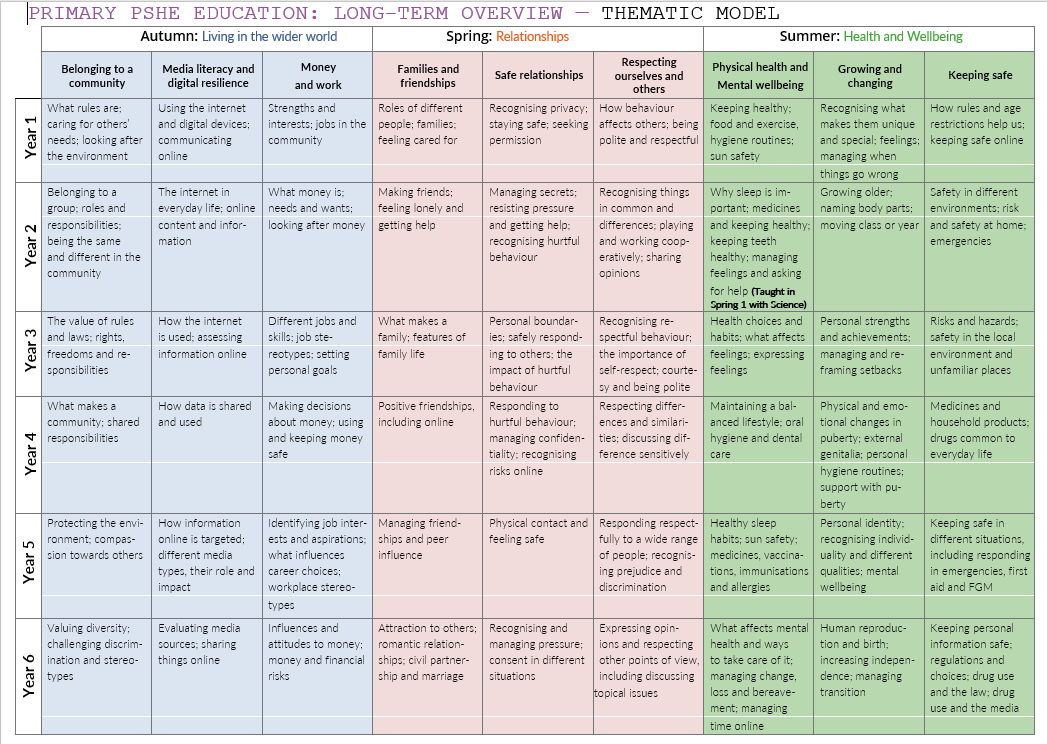PERSONAL, SOCIAL, HEALTH AND ECONOMIC EDUCATION INCLUDING RELATIONSHIPS AND SEX EDUCATIONPSHE
Our curriculum has four features
Intent At North Tawton Primary School, we believe that a quality PSHE curriculum should be a planned as a developmental programme of learning through which all children and young people acquire the knowledge, understanding and skills they need to manage their lives now and in the future. The new government guidance for Relationship, Sexual and Health Education has been incorporated into our wider PSHE curriculum. As part of a whole-school approach, PSHE education develops the qualities and attributes pupils need to thrive as individuals, family members and members of society. We are aware of the way that PSHE supports many of the principles of safeguarding and links closely to schools’ Safeguarding Policy. We are all aware of the important role the PSHE curriculum has in supporting school to implement the 9 protected characteristics of The Equality Act 2010. Through our PSHE curriculum, we recognise our duty to ‘actively promote’ and provide opportunity for children understand the fundamental British values first set out by the Government in the ‘Prevent’ strategy in 2014, of
PSHE education equips pupils to live healthy, safe, productive, capable, responsible and balanced lives. It encourages them to be enterprising and supports them in making effective transitions, positive learning and career choices and in achieving economic wellbeing. A critical component of PSHE education is providing opportunities for children and young people to reflect on and clarify their own values and attitudes and explore the complex and sometimes conflicting range of values and attitudes they encounter now and in the future. PSHE education contributes to personal development by helping pupils to build their confidence, resilience and self-esteem, and to identify and manage risk, make informed choices, develop healthy relationships and understand what influences their decisions. It enables them to recognise, accept and shape their identities, to understand and accommodate difference and change, to manage emotions and to communicate constructively in a variety of settings. Developing an understanding of themselves, empathy and the ability to work with others will help pupils to form and maintain good relationships, develop the essential skills for future employability and better enjoy and manage their lives. Implementation Our curriculum incorporates the new government guidance for Relationships and Sex Education (RSE) and Health Education published in 2019 and closely follows the aims of the National Curriculum for PSHE 2014. PSHE education is timetabled in the same way as any other subject. Our Programme of Study for PSHE education will develop skills and attributes such as resilience, self-esteem, risk-management, team working and critical thinking in the context of three core themes: health and wellbeing, relationships and living in the wider world (including economic wellbeing and aspects of careers education). Resources from a wide range of sources are used to support the PSHE curriculum: PSHE AssociationMedway SREIslington PSHECommon Sense Digital LiteracyNHS Healthy Schools Anna Freud National Centre for Children and Families Mentally Healthy SchoolsThink U Know (CEOP) These will be used reflectively to ensure the needs of each school are recognised and that the strengths and difficulties, as well as previous learning, of the students are developed when making decisions about appropriate learning and opportunities. The model of assessment we will advocate is that for each new topic, module, or series of lessons, an initial activity is carried out that gauges pupils’ starting point in terms of their existing knowledge, skills, attitudes and beliefs. This will be used to inform teachers’ planning for that module. Then, at the end of the module an activity will be carried out that will assess what the children know. Impact As a result we will have young people who have regular opportunities to reflect on and identify what they have learned, what needs to be learned next and what they need to do to continue their learning. They will have an understanding of the following concepts
This Curriculum statement is linked to : Acceptable Use Policy Accessibility Plan Behaviour Policy Equality Policy and statements RSE Policy Safeguarding Policy |
OUR CURRICULUM |
|
CONTACT
North Tawton Primary School Exeter Street, North Tawton, Devon, EX20 2HB Tel: 01837 82284 Email: [email protected] Media enquiries: [email protected] |
© COPYRIGHT 2020 DARTMOOR MULTI ACADEMY TRUST. ALL RIGHTS RESERVED | Website design by brightblueC and Alex Thomas Design | Privacy notice



